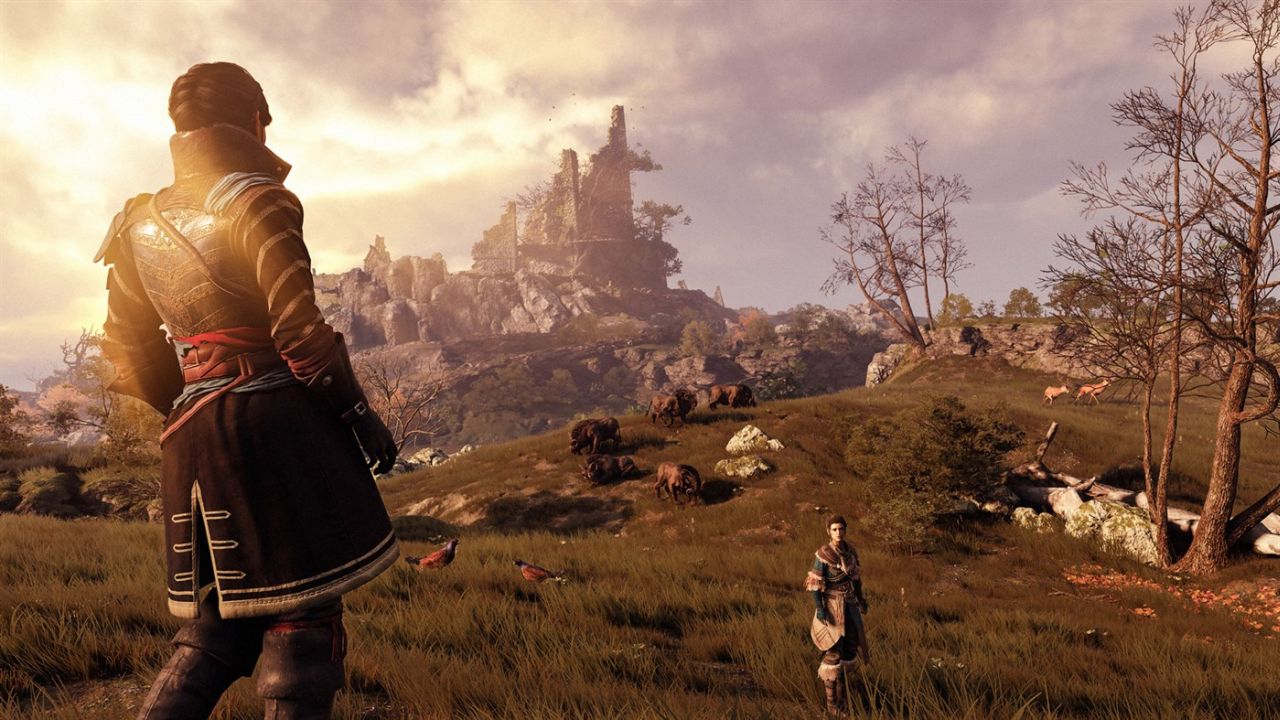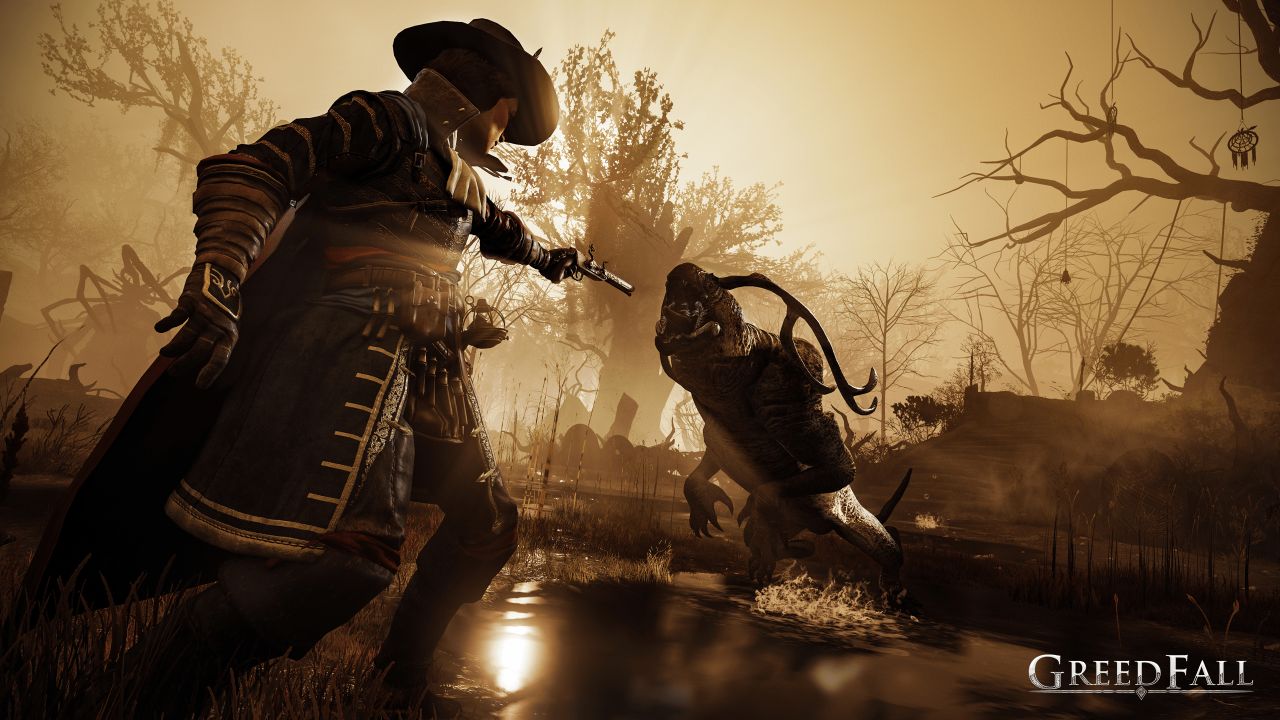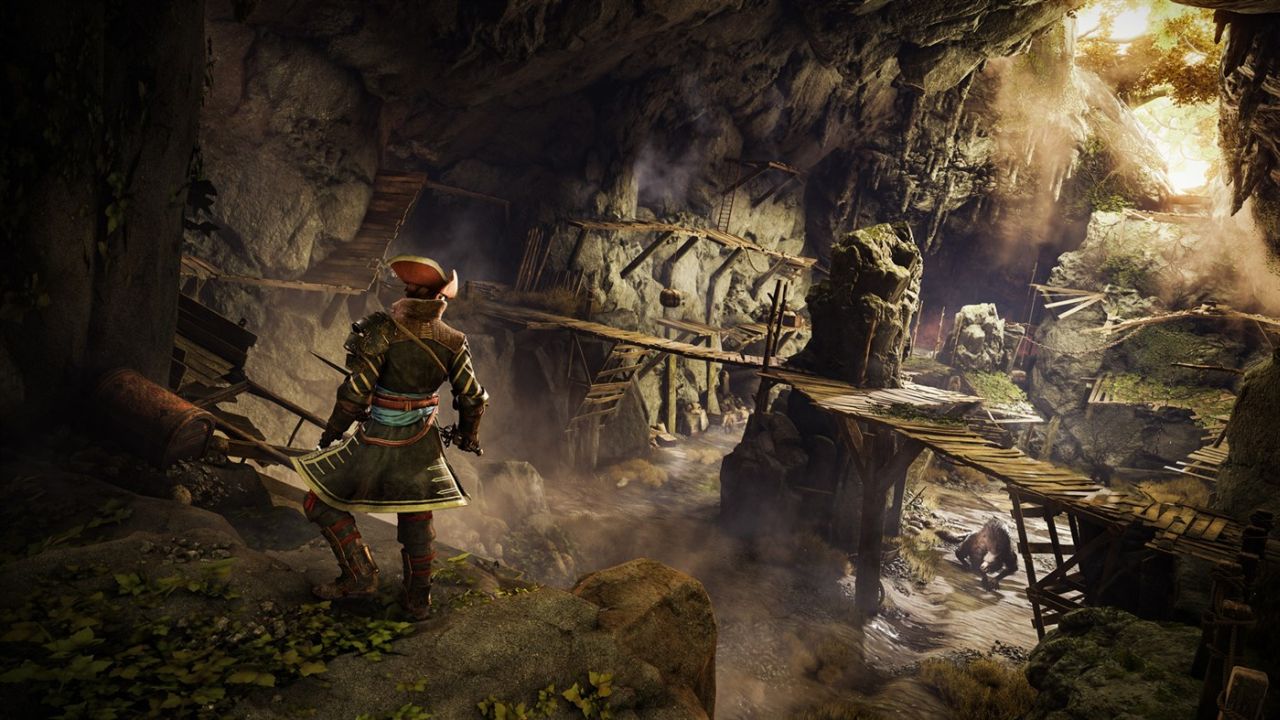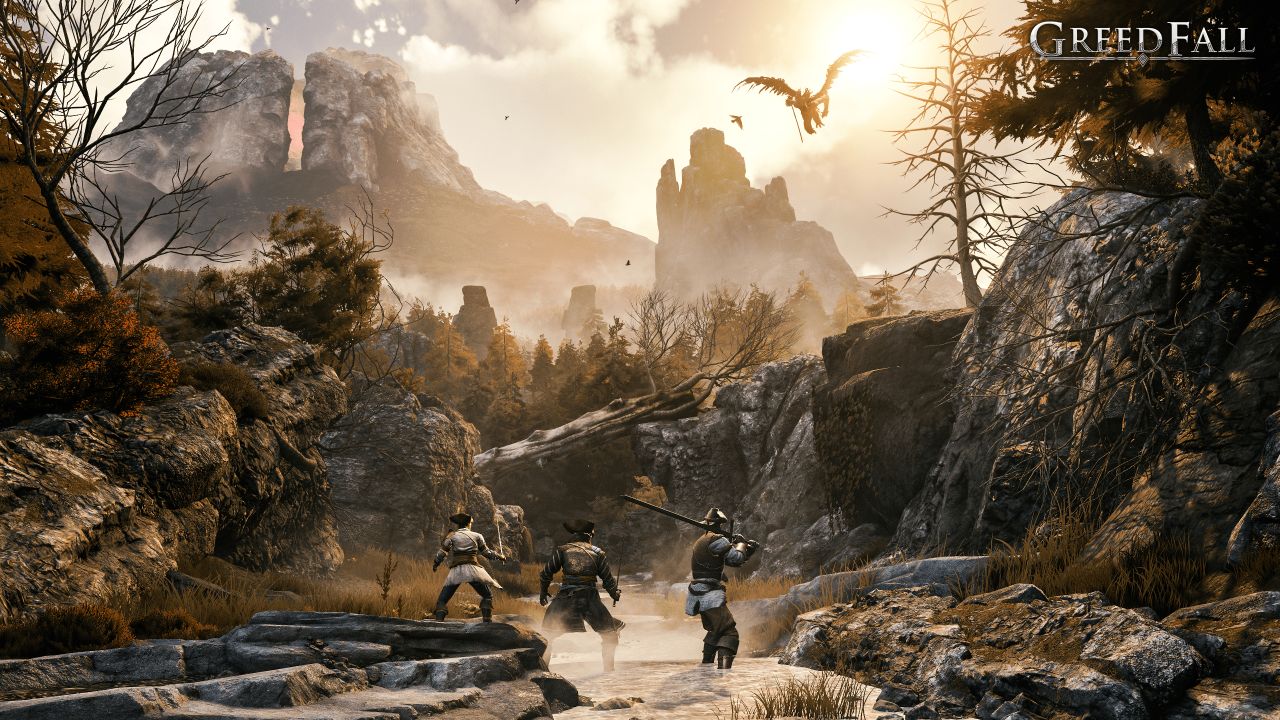GreedFall Review
Spiders delivers an ARPG surprise
It's worth noting that GreedFall is made by the same studio responsible for The Technomancer - a mediocre action RPG with a clumsy combat system, broken balancing, and a complete lack of polish. It wasn't very memorable, but it's an important game to remember in this context because it illustrates how far the development studio Spiders has come.

Having just created a critical catastrophe makes it even more impressive that their very next project was GreedFall – an action RPG that's on the verge of greatness. It's still full of problems and thinly veiled attempts at replicating the tried and tested trademarks of other studios to mixed results, but GreedFall's overall competence is an impressive demonstration of how much these developers have progressed in their RPG-making endeavors.
One of GreedFall's greatest strengths is its extraordinarily unique setting – especially for the genre. The bulk of your adventure takes place on a Western European-esque island in the swashbuckling 1600s. There are muskets, rapiers, Galleons, and tricorne hats aplenty. The island's autumnal landscapes are extremely pleasant to take in, and its seaside shanty towns feel just as dingy and lived-in as they must've felt in the flesh.
You'd be easily fooled into thinking GreedFall is historical fiction from the outset, but it also prominently features more fantastical elements that keep its setting shrouded in mystery and intrigue. Aspiring mage builders will be pleased to know that magic does indeed exist in this universe, and plenty of the island's creatures defy our earthly taxonomy.
On paper, filling a more grounded and earthly setting with fantastical spells and magics shouldn't work, but GreedFall borrows heavily from The Witcher to maintain a consistent tone that strikes a good balance. The spell variety and usage are reigned in to prevent the 17th century setting from feeling like high fantasy, and the creative creature design doesn't feel out of place in these tree and mud-filled locales. It's a setting that works.
While the setting is stellar, the plot and main story of GreedFall aren't as great. You customize and play as a noble who sets sail to the recently-settled island of Teer Fradee in search of a cure for your mother's plaguing illness that's left her blind and on the verge of death. After completing a short prologue sequence that has you preparing before setting sail, you interact with the various factions and island natives that are all vying for control over the island and its resources.
There's plenty of potential here that allows for a main plot full of political strife and conflict, but its lack of originality and frequent meandering keep it from packing a punch. Themes of discrimination and the futility of politics are everywhere, but they don't go much deeper below the surface which causes them to come across as low-hanging narrative fruit that required little writing effort. There are some great conversations and stopgaps along the way, but the main plot's superficially shallow thematic foundation robs some of those moments of their emotional impact.
The game's endless sidequests similarly run the gamut – each exclamation mark on your map could just as easily be a strong story-driven misadventure or a pointless and padded fetch quest that exists solely for experience points. There are still a good number of side activities that have you doing favors for factions that offer intriguing glimpses into this island's political landscape. Being rewarded not only with XP, but also with little morsels of knowledge makes a great number of sidequests well worth your while.

But then there are the sidequests that absolutely aren't worth your time. Kill this many of those, bring me this number of that thing, etc. Quests like these could have been enhanced by providing you with similarly lore-driven rewards, but the conversations you have along the way are often fruitless. This design is understandably standard in an RPG as extensive as GreedFall – but we're also beginning to see games of the genre move away from that trend which makes these quests feel more antiquated in comparison. The pointless side stuff just pops up too often to prevent the occasional groan.
GreedFall's combat, on the other hand, is a significant step up from Spiders' prior attempts. Each encounter plays out in real time with you having direct control over your character, while up to two AI-controlled party members can join you and do a surprisingly decent job of dealing damage and making sure you stay alive. Sword slashes, magic projectiles, blocks, and dodges are all responsive and a simple button press away. Movement feels fluid, a lock-on minimizes camera frustrations, and assignable shortcuts let you drink a potion or use an item on a moment's notice.
The enemy variety in GreedFall also serves to keep the combat interesting. While most of the mechanics boil down to tapping the attack button and rolling away when retaliation is imminent, different enemies require different tactics to defeat. Flying bats are usually easier to dispatch with a musket, armored guards are susceptible to magic which completely bypasses their armor value, and bands of bandits will usually have a few ranged attackers that hang back while the brutes go in close. Stealth is also an option, but since the AI vision cones are so finicky you're better off ignoring it altogether. Regardless, every journey requires adequate preparation and encounters frequently necessitate careful planning – both of these give the lesser encounters a satisfying sense of strategy.
There are also boss fights sprinkled throughout which are basically just big things with long health bars and frustratingly far-reaching attacks, but they sure do look cool. They range in size from hulking tree-like beasts to smaller mammalian creatures, but they all pack a sizable punch with attacks that can mow through you and your companions without batting an eyelash. Getting grazed by a poorly-telegraphed sweeping blow that drains your health bar and forces you to restart from your last save can be crazy-making, but their incredibly unique designs and superb music almost make it all worth enduring just to see what the next one looks like.
When you're not hacking away at giant island monsters, you'll be spending a whole lot of time running from point to point, talking to people, and completing arbitrary quest objectives in far less flashy fashion. The landscapes are pretty, yes, but it's not as nice when you're stuck navigating the claustrophobic and mazelike streets of yet another shanty port town, trying to find the entrance to the building that contains your next objective. A compass and map are generous enough to tell you right where you're supposed to go for each quest objective, but getting there isn't fun.

GreedFall is filled with conversation trees and alternate solutions that thankfully give you something meaningful to do when you finally reach your destination. Dialogue choices could impact your relationship with an island faction, open up a non-lethal way forward, or even net you a new party member in some instances. The writing occasionally verges on pretentiousness by injecting some needless flavor text fluff that serves no greater purpose other than to try and ape the likes of BioWare, but there are some legitimately interesting conversations to be had with multifaceted and complex characters.
Like most RPG's, all these conversations, fights, and journeys on foot are in service of gaining experience points and increasing your overall level – and GreedFall's system for doing so is surprisingly satisfactory. Every level will provide at least one point to pump into your skill tree, an attribute point, or a talent unlock. The skill tree dictates what weapons your character can wield, attributes give you a little boost to things like your attack power or max health, and the valuable talents give your character useful new abilities like lockpicking or potion crafting.
These three trees alone can take a while to get acclimated to, but they allow for extensive character customization and provide plenty of rewards that keep you perpetually pushing toward that next level. After creating your character, you get to pick one of three classes and get a couple of talent points to get started, but there's nothing stopping you from experimenting with different styles of play. The only thing standing between you and the gunslinging mage or trapper rogue of your dreams are a few levels and skill points.
Loot fanatics can rest assured knowing that there's plenty of new equipment to plunder from hidden chests and defeated enemies. There's a healthy variety of light swords, heavy halberds, quick pistols, and burly blunderbusses to experiment with, as long as you have the right skills and stats to wield them. The equipment diversity doesn't stop there either, as there are tons of armors, helmets, boots, and even capes to deck your character out with in suave 17th century fashion that can also shield you from physical blows.
The generous loot drop rate can encumber you as there's a weight limit, but it's rarely a nuisance thanks to an intelligent feature that the travel system employs. GreedFall's map is made up of delineated zones with travel gates that bring you to the next area. Instead of hitting you with loading screens, these zone transitions instead let you wander around a small transitionary area while the next locale loads. These areas not only let you swap out or speak with your party members, but they also have a shop where you can buy more consumables and sell all your junk. It's an extraordinarily smart addition that maintains the flow of perpetual progress by giving you easy and immediate access to a shopkeeper as well as an excuse to touch base with your party members. It's an awesome feature.

All the depth and breadth of GreedFall does come at a cost, however, and the visuals see the most sacrifices. Assets are muddy, building interiors are reused ad nauseum, and lip syncing is nearly non-existent – a detail which is especially noticeable in dialogue-heavy game like this one where faces are frequently center frame. As mentioned before, the island landscapes are often picturesque, but the façade quickly breaks down as you begin to look closer.
That being said, the base PS4 handles GreedFall surprisingly well. These aren't AAA-tier visuals, but mob encounters can get busy and magic usage can make the particle effects fly. The frame rate stays stable and transitions into and out of buildings are smooth and seamless. Despite the stability, you're bound to come across the occasional technical oddity. Fidgety character models and clipping objects occur periodically courtesy of frequently fidgety collision. The in-engine cutscenes can also be completely ruined by a wandering NPC that decided to walk into frame. It's all funny video fodder, but it highlights a lack of finer polish.
Taking a step back and looking at GreedFall in its entirety, it's hard not to be nonplussed by the whole thing. The gameplay can be great, but navigating its cityscapes is a frequent nuisance. Its combat and progression systems are competently constructed, but the visuals leave a lot to be desired. The character conversations can prove compelling, but the plot's themes ring hollow. GreedFall is full of unavoidable problems but also brief glimpses of greatness. What stands out amid it all is a solid action RPG core that facilitates a generous amount of creative character building and gratifying progression. Its target audience may be limited, but Spiders have created something that the western RPG fans can undoubtedly appreciate.
 Comments
Comments



















